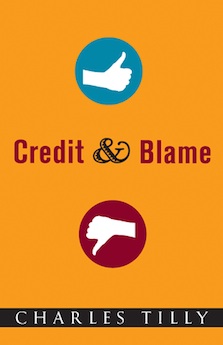By Sarah Gustafson
The May 2, 2008, New York Times obituary for the esteemed Dr. Charles Tilly, the Joseph L. Buttenwieser Professor of Social Science at Columbia University, quoted the author of Credit and Blame speaking about his academic mission and personal goal. His mission? “To do sociology, history and political analysis at the same time,” seeing the harmony of these often disparate disciplines as capable of provoking dialogue and change. No surprise then that, as Tilly wrote to the Times in 1969, “One way I’d like to improve social life is to get a guy to stop for five minutes or one minute or 10 seconds and listen to what the other guy says.”
Credit and Blame reflects both that scholarly drive and a commitment to transmuting perennial philosophical questions into modern and sometimes quotidian contexts. Divided into five chapters that address society, justice, credit, blame, and memory and loss, the work numbers scarcely 150 pages but discriminately covers great ground to “clarify the social processes by which people arrive at assignments of credit and blame.” This is no marriage of high and low. It is a considerate tapestry of the two, providing the reader with an experience that is accessible, entertaining, and intellectually fulfilling. It is shocking that Tilly never participated in a TED conference; for the TED aficionado, for the serious intellectual looking for a lighter book; for the casual reader itching to think big about daily life, this is a must read.
On the one hand, he discusses “large-scale political processes” and major historical events in order to show how the assignation of credit and blame contributes to an innately human pursuit of justice. It is key to Tilly’s argument that this pursuit of justice, and justice itself, despite what cultural relativism may claim, is far more similar across cultures than different. Rather, particular situations establish “us-them boundaries” and dynamics of “insider/outsider” – attested to by George Washington’s fear of factions; South American immigration and land disputes; the Israeli-Palestinian conflicts; or squabbles over awarding a Nobel Prize. These dividing lines turn a pursuit of what is just and right among people or inside communities into combative “melodramas of good guys, bad guys, and just deserts.”
Yet Tilly reminds us that the procedures for assigning credit and blame on the world stage do not much differ on the small scale: “Daily experience… makes us all experts on credit and blame.” As such, the work is sprinkled with readable and relatable anecdotes from his own life, whether from childhood, his first job, or his struggle alongside undergraduates to respond appropriately to the September 11 attacks in light of compassion for human suffering and political theory on justice and just war. The chapter on credit launches from a discussion of Academy Award acceptance speeches into analysis of the social processes of “tournaments, honors, promotions, and networks” give positive blame, or credit, where it is due, establishing relationships on one side of the us-them boundary… These “justice detectors” can serve the cause of right as often as they reveal the symptoms of a diseased system, as in the case of undeserved promotions, unequal wages, or nepotism.
Tilly ends with the work’s most profoundly political and profoundly difficult commentary, as he moves into examining blame, memory, loss, and the ways these change political interactions. Drawing context from several nasty and heart-wrenching civil suits and criminal cases, he raises questions such as how to place value on a human life and on a good life, and how to place blame appropriately in order to cope with loss effectively. Blame is not the opposite of credit, but credit’s “image in a funhouse mirror.” Bent out of shape by each individual’s calculation of loss and gain, it is proportionately distorted in the greater “us-them” group conflicts caused by history, sociology, and politics. In a style extremely evocative of Max Weber, he poses the question: what pathways remain open then for restoring order and justice by recognizing blame and punishing necessarily? Not always, he answers, that of politics:
“Writing us-them divisions into law and politics undermines democracy… use of public power to fix credit and blame writes ‘us-them’ divisions into political life. It also reinforces the operation of the same divisions in private life…Be very careful when you call for the authorities to back up your assignments of credit and blame.”
His warning, which draws from the history of World War I, resonates particularly deeply in an anniversary year – which itself has seen the drawing of radical new “us-them” boundaries. Tilly does, however, allow his readers to draw comfort from two truths, in the spirit of Weber’s “Nevertheless!” He reminds us that that “Justice matters to everyday relations as it matters to public life”; it cannot long be ignored if it is uncomfortable. The obligation, then, falls on us to understand the “interpersonal transactions and relations” that create narratives of credit and blame, and work towards justice as we can. Time to improve life by stopping, talking, and reflecting on what “the other guy said.”
Sarah Gustafson (ΦBK, Davidson College, 2014) is a candidate for the master’s degree in the History of Political Thought and Intellectual History at University College London, and looks forward to her future pursuit of a Ph.D. in European History.




